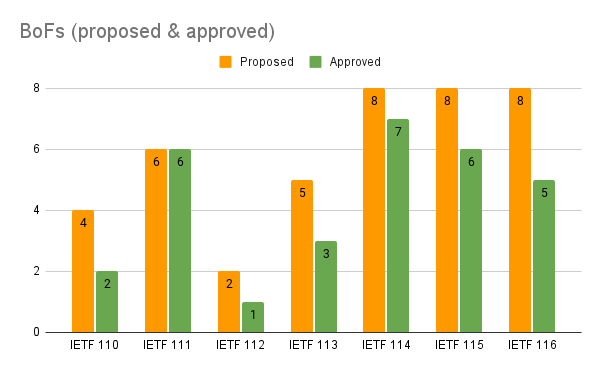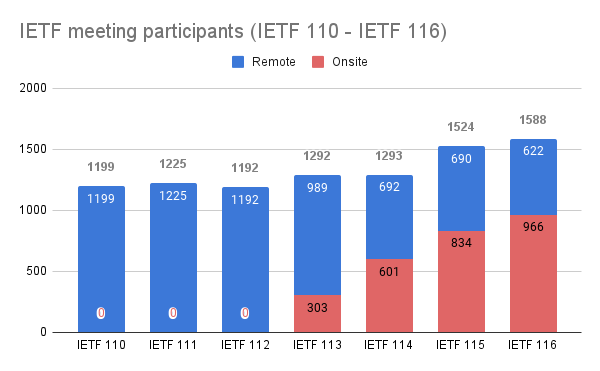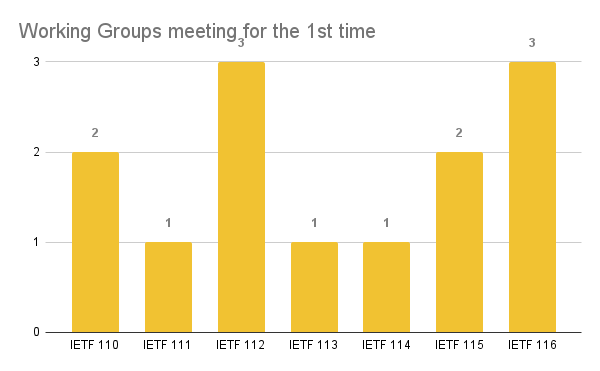The deadline for submitting your Birds of a Feather session proposals for IETF 116 is quickly approaching, so don’t wait any longer to share your ideas with the community. Birds of a Feather sessions are a great opportunity for like-minded individuals to come together and discuss topics of mutual interest.
Whether you have a burning question you want to explore further, a new technology you want to introduce to your peers, or simply want to connect with others who share your passion for a particular area of internet technology, a Birds of a Feather session is the perfect platform to do so.
By submitting your proposal now, you can help shape the agenda for IETF 116 and ensure that your voice is heard among your fellow colleagues and peers in the industry. So don’t delay, submit your proposal today and be a part of the conversation at IETF 116!

How to Prepare Your Proposal
Preparing a proposal requires careful planning and attention to detail. The first step is to clearly define the problem or issue you are addressing and identify potential solutions. Researching similar proposals and gathering relevant data can help strengthen your argument. It is important to consider your audience and tailor your proposal to their needs and preferences.
Organizing your proposal in a logical and easy-to-follow format is crucial for clarity and coherence. Including visual aids, such as charts or graphs, can help convey complex information more effectively. Additionally, proofreading and editing your proposal multiple times is essential to ensure it is error-free and professional. Seeking feedback from colleagues or mentors can also provide valuable insights and improve the overall quality of your proposal.
Finally, submitting your proposal in a timely manner and following any specific guidelines or requirements set by the recipient is key to maximizing your chances of success. By following these steps and putting in the necessary effort and attention to detail, you can increase the likelihood of your proposal being well-received and achieving your desired outcomes.
Topics and Themes for IETF 116
The upcoming IETF 116 conference will focus on a wide range of topics and themes related to the ever-evolving landscape of technology and internet standards. One key area of discussion will be the advancement of protocols and standards for enhancing internet security and privacy.
This includes exploring new ways to protect users’ data and information from potential threats and vulnerabilities. Additionally, the conference will delve into the development of protocols to support the growing demand for internet of things (IoT) devices and services. This involves addressing challenges such as interoperability, scalability, and security in the IoT ecosystem.
Another important theme for IETF 116 is the continued evolution of internet infrastructure and network protocols to support the increasing demands of high-speed, low-latency applications and services. This includes discussions on the adoption of new technologies like IPv6, QUIC, and DNS over HTTPS to improve the overall performance and reliability of internet communications.
Furthermore, the conference will explore ways to promote inclusivity and diversity in the development of internet standards, ensuring that the voices and perspectives of all stakeholders are represented in the decision-making process. Overall, IETF 116 will provide a platform for industry experts, researchers, and policymakers to collaborate and innovate on key challenges and opportunities facing the internet community today.

What Makes a Successful Proposal?
A successful proposal is one that clearly outlines the problem or issue at hand, provides a well-thought-out solution, and demonstrates the feasibility and effectiveness of the proposed plan.
It is important that the proposal is well-researched and supported by evidence and data to back up the claims being made. The proposal should also consider the needs and perspectives of all stakeholders involved, taking into account their concerns and feedback in order to create a well-rounded and inclusive plan. Additionally, a successful proposal should be concise and to the point, avoiding unnecessary jargon or technical language that may be confusing to the reader.
It is crucial that the proposal is presented in a clear and organized manner, with a logical flow of ideas and a compelling argument for why the proposed solution is the best course of action. Finally, a successful proposal should also address any potential challenges or obstacles that may arise, and provide a plan for how these will be overcome. By considering all of these factors, a proposal is more likely to be successful in achieving its intended goals and making a positive impact on the issue at hand.
Benefits of Hosting a Birds of a Feather Session
Hosting a Birds of a Feather session can offer numerous advantages for both the organizers and participants. These sessions provide a platform for like-minded individuals to come together and discuss common interests, share experiences, and network with others in their field.
By facilitating these gatherings, organizers can create a sense of community and foster collaboration among attendees. Birds of a Feather sessions also allow for more focused and in-depth discussions on specific topics, enabling participants to gain valuable insights and learn from each other’s experiences.
Additionally, these sessions can help individuals build relationships and establish connections with others who share similar interests, leading to potential collaborations and partnerships in the future. Overall, hosting a Birds of a Feather session can be a rewarding experience for everyone involved, offering a unique opportunity to connect with others, exchange ideas, and further their knowledge in a particular area of interest.

Submission Guidelines and Deadlines
Submission guidelines and deadlines are essential components of any project or assignment. They provide a framework for individuals to follow in order to ensure that their work is completed in a timely and efficient manner. Guidelines outline the expectations and requirements for the submission, including formatting, length, and content.
Deadlines, on the other hand, establish a specific timeline for when the work must be completed and turned in. Adhering to these guidelines and deadlines is crucial for the success of a project, as they help to create a sense of order and accountability. Failure to comply with the guidelines and deadlines can result in disorganization, confusion, and ultimately, a failure to meet the objectives of the project.
Additionally, adhering to submission guidelines and deadlines demonstrates professionalism and respect for the project and those involved in it. It shows a commitment to producing high-quality work and meeting expectations. Therefore, it is important for individuals to carefully review and follow the submission guidelines and deadlines for any project or assignment they are working on. By doing so, they can ensure that their work is completed in a timely manner and meets the necessary requirements for success.
